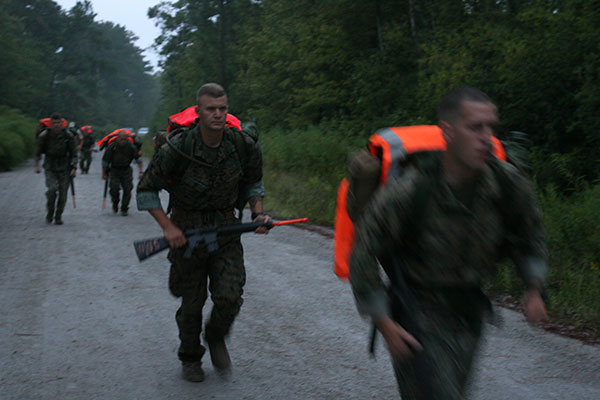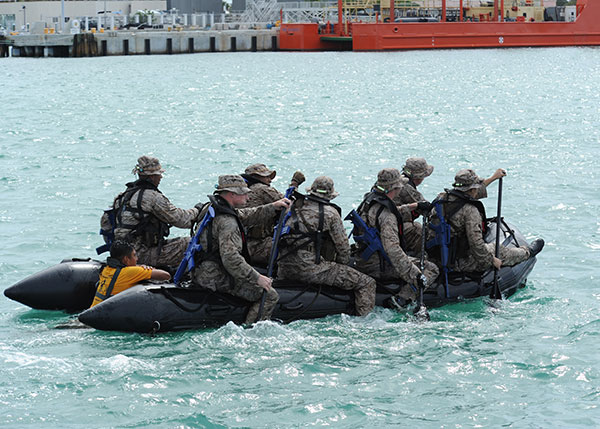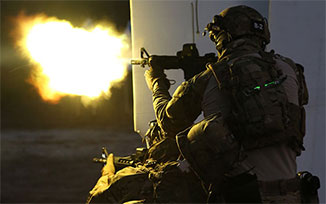MARSOC - Critical Skills Operator Selection & Training
Critical Skills Operators (CSO) are assigned to Marine Special Operations Teams (MSOT), Companies (MSOC) and Battalions (MSOBs). They are MARSOC's frontline fighting elements. As is to be expected, the selection and training process for CSOs is intense and unforgiving.
Screening
In order to start on the road to becoming a CSO, recruits must meet the following requirements:
- Minimum GT: 105 (no waivers accepted)
- Minimum PFT score: 225 (regardless of age)
- Male
- Enlisted: Any MOS, E-4 to E-5, between 3 and 7 years time in service; MARSOC is no longer accepting Staff Sergeants.
- Officer: Any unrestricted ground officer, O-2 to O-3. First Lieutenant: must be career designated; Captain: no more than 1.5 years time in grade.
- No NJP within the last 12 months or no more than 2 in current contract. No NJP as an Officer.
- No derogatory Page 11 entries within the last 12 months. SNCO & Officer's with derogatory Page 11 entries require a waiver.
- No incidents of drug abuse or possession.
- No adverse fitness reports within 12 months
- No court martial convictions
- Marine must be medically fit and have a current record of NSW/SO Duty Medical Examination. Click here for more Medical Screening criteria. (Link to medical)
- Must have a minimum of 3 months remaining on current contract or by extension to participate in the scheduled A&S and, if selected, be willing to reenlist or extend to meet minimum 36 month CSO obligated assignment tour at MARSOC. Officers must be willing to execute 48 month obligated assignment tour upon completion of ITC.
- Marine must have an adjudicated eligibility Secret in JPAS or command NACLC submitted date.
Assessment & Selection
A 3 week Assessment and Selection Preparatory and Orientation Course (ASPOC) proceeds the main selection phase. The goal of APSOC is to prepare the applicants for the Assessment and Selection by enhancing their levels of physical and mental fitness. It also serves to educate the applicants in the roles and type of mission expected of a MARSOC CSO.
click here for the official USMC 10-week A&S preparation guide
The Assessment and Selection (A&S)
course itself is run 3 times a year at an undisclosed location and tests the applicant's physical and mental stamina. Tests include ruck marches, land navigation, swimming and mental aptitude.

Individual Training Course (ITC)
Those applicants who make it through selection will move on to the Individual Training Course (ITC). This 7-month course is designed to produce Critical Skills Operators capable of deploying to the field. It consists of 4 phases:
Phase 1: Basic field skills are taught and tested, including Survival, Evasion, Resistance, and Escape (SERE), Tactical Combat Casualty Care (TCCC) and extensive communications training. A rigorous physical fitness program begin in phase 1 and is continued throughout the course.
Phase 2: Building upon phase 1, the next phase teaches mission planning, fire support training, small boat operations and scout swimming, demolitions, photography and information collection/reporting and crew served weapons. A 9-day exercise, "Operation Raider Spirit", is run to evaluate the candidates in patrolling and combat operations. Following on from this, students are taught Special Reconnaissance skills on a 3-week course. The end of phase 2 is an exercise, "Operation Stingray Fury", which tests the ITC students in urban and rural reconnaissance.

Phase 3: Focusing on close quarters combat (CQB) operations, phase 3 of the ITC trains the student to high degrees of proficiency in rifle and pistol marksmanship (Combat Marksmanship), CQB Tactics, Techniques and Procedures, demolitions and urban combat skill sets employed by a frontline Marine Special Operations Team (MSOT). Phase 3, which lasts 5 weeks, culminates in a series of simulated raids against urban and rural targets in an exercise named “Operation Guile Strike”.
Phase 4: The final phase of ITC focuses on the Critical Skills Operator's role of Irregular Warfare. A final 3-week exercise, "Derna Bridge", requires the students to apply all the skills learnt throughout the ITC in order to train, advise and lead an irregular force from a partner nation on a series of missions.
Further Training
There are a number of advanced training courses/qualifications available to Critical Skills Operators once they are assigned to a MSOB. Many of these courses are taught at the Marine Special Operations School (MSOS).
- Airborne Training (U.S. Army Airborne School)
- SCUBA (U.S.M.C. Combatant Diver Course)
- Advanced Linguist Course (ALC)
- MARSOF Advanced Sniper Course (MASC)
- MARSOF Close Quarters Battle Level II (MCQBL2)
- Marine Technical Surveillance Course (MTSC)
- MARSOF Dynamic Entry Level II Course (MDEL2)
- Tactical Acquisition Exploitation (SR level II)
- Hostile Forces Tagging Tracking Location (HFTTL)
- Helicopter Rope Suspension Training (HRST)
- Advanced EOD
- Joint Terminal Attack Controller (JTAC)
- Unmanned Aircraft System (UAS) Operator
- Survive, Evade, Resist and Escape (SERE)





